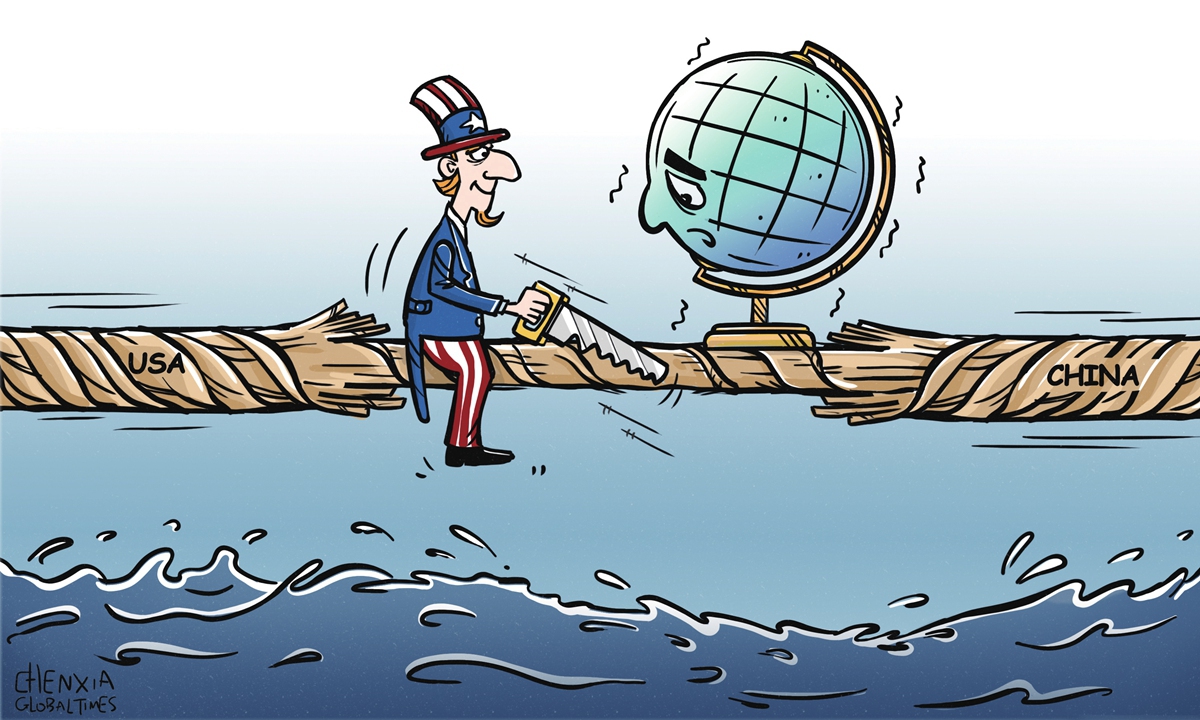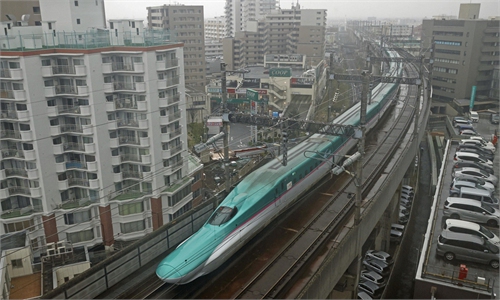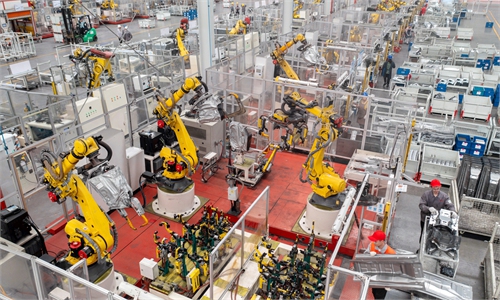
Illustration: Chen Xia/GT
For many years, free trade and unfettered globalization have acted as the locomotive raising economic growth rates and helping pull tens of millions of people out of poverty in the world. But things seem to change fast. The "decoupling" and economic fragmentation orchestrated by the US government is rapidly chipping away at the fruitful results of globalization.The path back to robust global growth is getting rough and looks increasingly foggy. The ropes that once held the world together are weakened compared with a decade ago, thanks to the US-led protectionism.
To make things worse, the current economic weakness facing major Western economies including the US will inevitably be aggravated by this protectionism and technology "demarcation" attempt aimed at suppressing China's growth.
However, China's development is all-around and inclusive on a global level, with its trade with many Global South developing economies steadily rising, making up a significant part of China's foreign trade, which reinforces both China and its partners. Despite the "decoupling" push by the US, China's exports of goods still recorded 10.3 percent growth in the first two months this year.
The reason why China's manufactured goods is popular among consumers around the world is because their affordability and high quality too. Chinese enterprises have put a lot of money and effort into innovation and they also developed highly efficient manufacturing procedures and highly skilled workers as well. The consumers around the world will love to buy good-quality products at low prices made by China.
Instead of trying to compete, the US response to China's manufacturing rise is to try to restrict China so they can't produce these things, which will inevitably cause China to develop those components and technologies in-house. The strategies employed by China to enhance its manufacturing capabilities are commendable rather than condemnable.
The imposition of tariffs on Chinese goods by Washington merely escalates the cost of those goods, challenging the affordability of America's middle-class workers and hurting the poor. Though exploiting xenophobia for political ends by Washington is easy, figuring out how to effectively cooperate and compete with China is much harder.
While the economic relations have cooled between the two countries, due in large part to the trade tariffs and the Biden administration's restless and endless suppression of Chinese high-tech companies, they still remain two of the largest trading partners, with a significant interdependence in many areas.
Above all, the basics of trade still reigns. There is a fundamental concept in global economics - you focus on what you are good at, and other countries do the same, and you trade and reap due benefits from trade. The problem facing America is how to increase the skills of its manufacturing workers and improve its industrial competitiveness.
Better American leaders would be looking carefully at the truly stunning manufacturing accomplishments China has made in the past years in industrial digitalization, in high-end home appliances, electronics, machinery and electric vehicles, high-speed train and subway and port infrastructure that China has completed in the last 30 years country-wide, and how these infrastructure investments are now powering Chinese efficiency and innovation.
And, China's high-level opening-up and mutually beneficial global cooperation are based on three factors: high-quality development of the new economy, high-quality development of the Belt and Road Initiative, and improvement of its economic governance system.
For the two heavyweight economies like China and the US, turning their back on each other is not an option, and for the sake of sustaining peace and nurturing better growth in the world, the two countries should get on pragmatic and down-to-earth terms and must avoid seeing one another as adversaries. Fair, open and ethical competition is good for both economies.
For some time, the world has been earful of the sensational narrative trumpeted by a few anti-China politicians in the West who yearned for "decoupling" or "de-risking" from China, which embodies those politicians' ill-intended geopolitical game to suppress Chinese economy and strangulate the country's rise on the global stage.
It is of great importance for the two countries to speak out loudly against economic disintegration or "decoupling," which runs counter to global development trend and lead to a retrieve in productivity and living standards.
China and the US just need to find the right way to get along with each other. For Beijing and Washington maintaining a pragmatic and non-confrontational working relationship is significant for regional and global economic development. In the Asia-Pacific region, which represents a substantial 62 percent of global GDP and nearly half of global trade, the US and China, the two largest economies, are able to create plenty of commerce and investment opportunities for all regional economies if they choose to cooperate on pragmatic terms.
It's time to tear down the trade tariffs and get back to the business of making money. The global economy is recovering, but its momentum remains sluggish; industrial and supply chains are still under the threat of interruption.
The divide between the two nations, however, is not as large as people might have been led to believe by reports in the media. Since 2002, when China joined the World Trade Organization, the two countries have brought less than 40 cases against each other. It's a remarkably low number considering the amount of trade carried out between the two countries.
China's new 24-point policy to attract foreign investment is another note-worthy move, aiming to improve investment opportunities for foreign companies, including American businesses, and eliminate all perceived barriers and restrictions and fostering quick economic growth.
The business community would welcome immediate steps, including the removal of tariffs and addressing all trade barriers. It would be in the best interest of both nations to take positive steps toward future cooperation in other areas of mutual interest, such as data security, environmental protection and international health cooperation.
The two countries are fortunate to have been successful in the past to create a robust trade relationship that benefits both peoples, and now there is no room for further tit-for-tat in tariffs. US Treasury Secretary Janet Yellen once suggested the two governments remove reciprocal tariffs imposed on respective imports, which, if implemented, can address a significant trade dispute.
The author is an editor with the Global Times. bizopinion@globaltimes.com.cn



